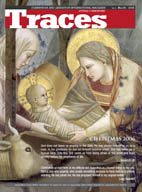
Traces N.10, November 2006
Surprise by a Fact“What makes us grow and broadens our mind is not abstract reasoning, but the discovery in humanity of a moment in which the truth is reached and spoken. This is the great inversion of method that marks the passage from the religious sense to faith–no longer a search full of unknowns, but surprise at a fact that has happened within the history of mankind.” (At the Origin of the Christian Claim; Foreword of the 2001 edition in Italian, p VI.)
This phrase by Fr. Giussani that we published on the cover of Traces, Vol. 8, No. 9 (the one dedicated to Benedict XVI’s address at Regensburg), rang out here and there across Italy and the world during the Opening Day of the Year for the Movement, starting from that held in Milan, the notes from which we offer on the first pages of this magazine. Later, , it rang out one October evening at the Teatro Meditteraneo in Naples. An article in the principal Naples newspaper, Il Mattino, bore the title: “The Challenge of Education to Liberate Naples,” almost in answer to the tragic events that are polluting the city with bloodshed these days. And to think that the journalists’ questions on the eve of the meeting were aimed at discovering the analyses and above all CL’s plans for fighting organized crime, corruption, unemployment and scholastic chaos, in that order. They were all invited to “come and see.”
Why is it that so many people, so tested by an increase in violence–one murder every twenty-four hours–and by old and new alarms that led to calls for the army be sent in to restore order in that city, left their work and worries to go hear a Spanish priest speaking about “living reality intensely”? What intensity of life is possible when your are unsure of everything–your school, your home and your job?
In Naples, at Vico Castrucci, number 4/b, is the Solidarity Centre run by the Campania Company of Works. It was begun by a group of friends who didn’t stop to analyze the situation, and make a list of all that was missing, and then reach the conclusion (like everyone else) that it’s impossible to do anything useful–except to hope for some crumbs of aid from the state. They set up something new to give voice to their living experience.
Only something real and present can rekindle hope, because it sets the “I” of each person in motion, opens it up, and this “I,” if it is adequately educated, takes a leading role in reality and builds something, even in the most difficult circumstances–for example, a solidarity center in the heart of the real Naples, to share people’s needs so as to share the meaning of life. Not a strategy, but the surprise of a fact; not even a research “full of unknowns” for solutions to the evils of personal and social life. For you can sustain hope for a solution, for a liberation only if you can point to someone who is living in a different way, in a truer and more human way; someone like us, exactly like us, but who won’t accept that change is impossible. Finkielkraut calls it an “event;” Montale calls it an “unforeseen.”
Naples is an example of how we try to respond with our lives to Benedict XVI’s appeal to broaden reason. Christian experience leads us to reach out into reality without censuring anything, but rather by facing up to everything positively. What takes us outside the measure of a restricted reason is an event–“a moment in which the truth is reached and spoken.”
“We have come across something that fills our life,” Carrón said in Naples on the evening of October 27th, “and we want to communicate it to whoever is willing to listen.” The Neapolitans who were in the Teatro Mediterraneo found the time and the openness to listen.